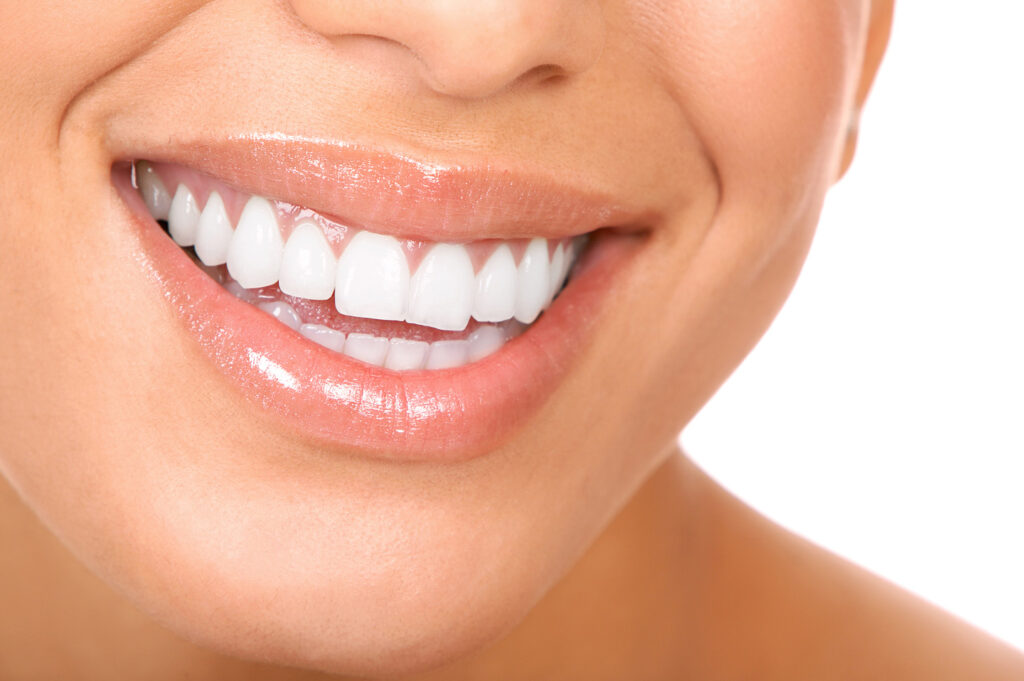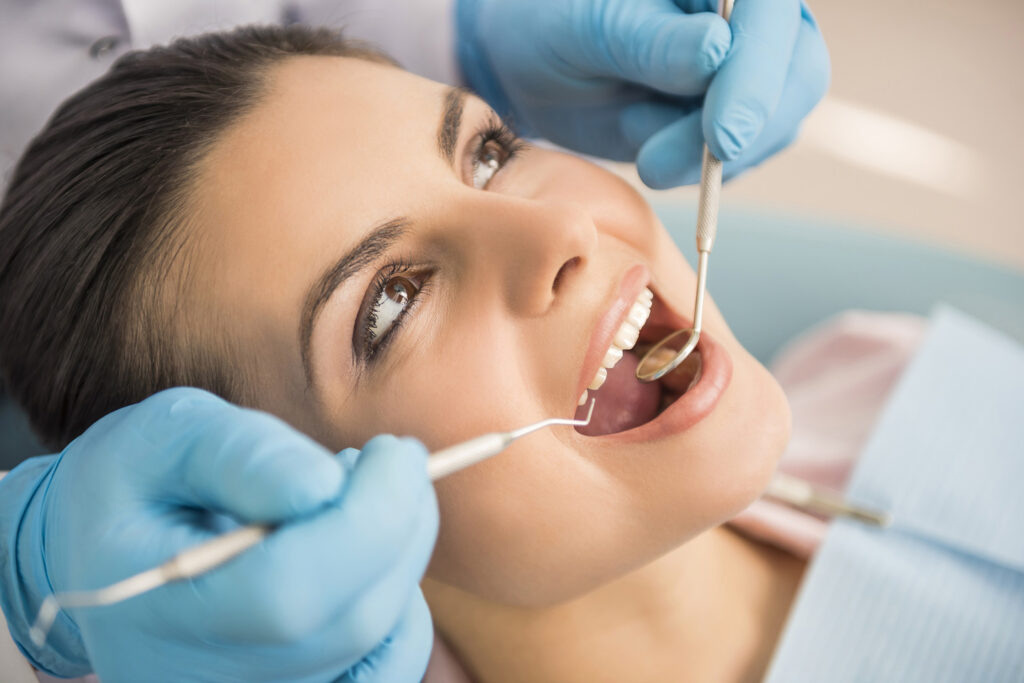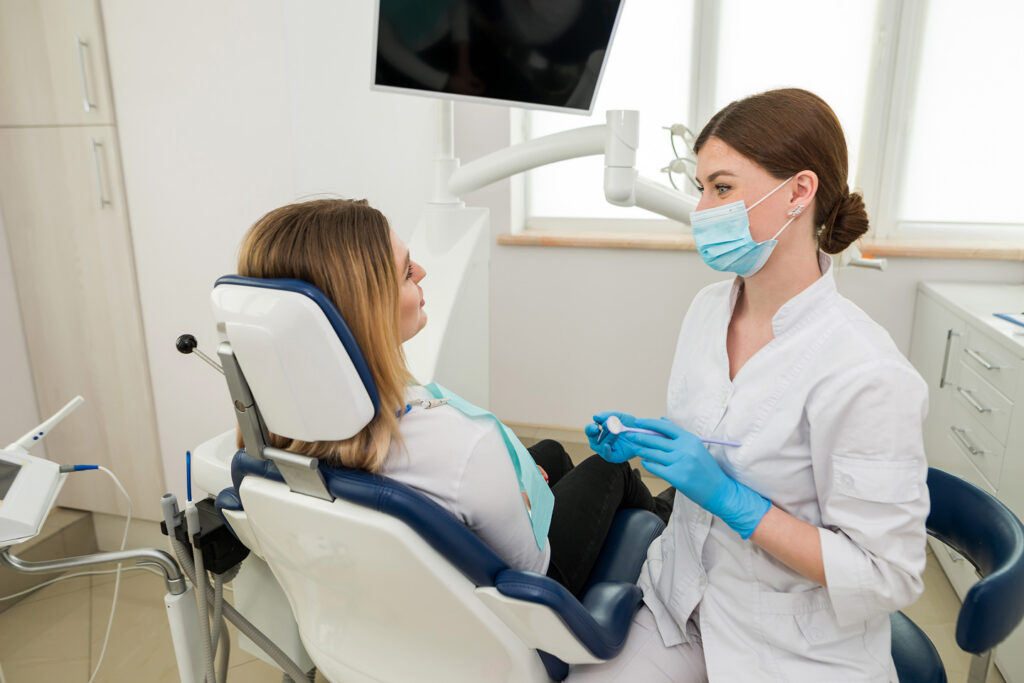Does Dental Cleaning Whiten Teeth?

Does Dental Cleaning Whiten Teeth? You’re diligent about your oral hygiene, attending regular dental cleanings to keep your teeth healthy. Yet, you might find yourself pondering, “Does dental cleaning whiten teeth?” Let’s delve into the intricate relationship between routine dental cleanings and the quest for a brighter, whiter smile. Understanding Dental Cleanings Dental cleanings, also known as prophylaxis, are routine procedures performed by dental hygienists with the primary goal of removing plaque, tartar, and stains from the surfaces of your teeth. This comprehensive approach aims to maintain optimal oral health by preventing cavities, gum disease, and other dental issues. Components of Dental Cleanings Scaling: The meticulous removal of plaque and tartar from the tooth surfaces, including between the teeth and below the gumline. Polishing: The smoothing of tooth surfaces to eliminate surface stains and create a clean, polished appearance. Fluoride Treatment: The application of fluoride to strengthen tooth enamel and prevent tooth decay. While dental cleanings are undeniably essential for oral health, their primary focus lies in preventive care rather than cosmetic enhancements. Does Dental Cleaning Whiten Teeth? The act of removing surface stains during the polishing phase can contribute to a subtle improvement in tooth color. However, it’s crucial to note that dental cleanings are not specifically designed as teeth-whitening procedures. The polishing process primarily targets extrinsic stains caused by factors like coffee, tea, or smoking. Intrinsic stains, which originate within the tooth structure, are not effectively addressed through routine cleanings. Common causes of intrinsic stains include age, certain medications, or exposure to excessive fluoride during tooth development. If you’re seeking significant whitening, additional cosmetic procedures like teeth whitening treatments may be recommended. Teeth Whitening vs. Dental Cleanings Teeth whitening procedures, whether conducted professionally or through over-the-counter products, focus on changing the color of the teeth. These procedures utilize bleaching agents to break down stains and lighten the overall shade of the teeth. In contrast, dental cleanings aim to maintain oral health by preventing issues such as cavities and gum disease. While they can contribute to a fresher and brighter appearance by removing surface stains, their primary purpose is preventive care rather than cosmetic teeth whitening. Maintaining Whitened Teeth If you’ve undergone a teeth whitening procedure, maintaining the results involves practicing good oral hygiene. Regular dental cleanings become even more critical after whitening treatments to prevent the buildup of new stains and maintain a vibrant smile. Conclusion Dental cleanings play a vital role in oral health, contributing to a cleaner and fresher smile. While they can have a subtle impact on tooth color by removing surface stains, their primary purpose is preventive care rather than cosmetic whitening. If you’re specifically interested in achieving a whiter smile, discussing your goals with your dentist is a proactive step. They can provide insights into professional teeth whitening treatments or recommend appropriate at-home solutions based on your dental needs and preferences. Remember, a healthy and bright smile is the result of a combination of good oral hygiene practices, routine dental cleanings, and, if desired, specific teeth whitening procedures.
Can Bad Oral Hygiene Cause Cancer? Debunking the Myth

Can Bad Oral Hygiene Cause Cancer? Debunking the Myth Maintaining good oral hygiene is not just about having a sparkling smile; it’s also crucial for overall health. While we often hear about the link between oral health and conditions like gum disease and cavities, there’s been increasing speculation about whether poor oral hygiene could potentially lead to more serious health issues, such as cancer. In this blog, we’ll delve into the evidence to determine whether there’s any truth to the claim that bad oral hygiene can cause cancer. Understanding the Oral Microbiome Before we delve into the relationship between oral hygiene and cancer, it’s essential to understand the oral microbiome. Our mouths harbor a diverse community of bacteria, fungi, and viruses, collectively known as the oral microbiome. Under normal circumstances, these microorganisms coexist in a balanced ecosystem, contributing to processes such as digestion and immune regulation. The Link Between Oral Hygiene and Cancer Several studies have explored the potential connection between poor oral hygiene and cancer risk. One area of interest is the association between periodontal (gum) disease and various types of cancer. Periodontal disease is characterized by inflammation and infection of the gums, often resulting from inadequate oral hygiene practices. Research suggests that individuals with periodontal disease may have an increased risk of certain cancers, including oral, esophageal, and pancreatic cancer. The proposed mechanism involves chronic inflammation and the release of inflammatory mediators, which could promote tumor development and progression in other parts of the body. However, it’s essential to note that while these findings are intriguing, they do not establish a direct cause-and-effect relationship between poor oral hygiene and cancer. Other factors, such as smoking, alcohol consumption, and genetic predisposition, also play significant roles in cancer development. Therefore, it’s challenging to isolate the specific contribution of oral hygiene to cancer risk. Furthermore, the evidence regarding the link between oral hygiene and cancer remains largely associative, based on observational studies. More robust clinical trials and longitudinal studies are needed to establish a definitive causal relationship between the two. Maintaining Good Oral Hygiene Regardless of the uncertainties surrounding the relationship between oral hygiene and cancer, maintaining good oral health remains essential for overall well-being. Here are some tips to promote a healthy mouth: Brushing and Flossing: Brush your teeth at least twice a day and floss daily to remove plaque and food particles that can lead to gum disease and tooth decay. Regular Dental Checkups : Schedule regular dental exams and cleanings to detect any oral health issues early and receive professional guidance on maintaining oral hygiene. Regular Balanced Diet: Eat a balanced diet rich in fruits, vegetables, and whole grains while limiting sugary snacks and beverages, which can contribute to tooth decay. Avoid Tobacco and Excessive Alcohol: Tobacco use and heavy alcohol consumption are significant risk factors for oral cancer and other health problems. Quitting smoking and moderating alcohol intake can significantly reduce your risk. Stay Hydrated: Drink plenty of water throughout the day to keep your mouth moist and wash away food particles and bacteria. Conclusion While the relationship between bad oral hygiene and cancer is an intriguing area of research, the current evidence does not conclusively prove a direct causal link. However, maintaining good oral hygiene remains crucial for overall health and well-being, as it helps prevent gum disease, tooth decay, and other oral health issues. By adopting healthy habits such as regular brushing and flossing, attending dental checkups, and avoiding tobacco and excessive alcohol consumption, you can promote a healthy mouth and reduce your risk of oral and systemic health problems. Remember, good oral hygiene is not just about your smile; it’s about safeguarding your health for the long term.
Navigating the Cost of Oral Cancer Surgery: A Comprehensive Guide

Navigating the Cost of Oral Cancer Surgery: A Comprehensive Guide Receiving a diagnosis of oral cancer is a daunting experience that brings about a flurry of concerns, one of which is the cost of treatment. Oral cancer surgery, a crucial aspect of managing this condition, can vary widely in cost depending on various factors. Understanding these factors is essential for patients and their families to prepare financially and make informed decisions about their treatment journey. The Complexity of Oral Cancer Surgery Oral cancer surgery encompasses a range of procedures aimed at removing cancerous tissues from the mouth, jaw, or throat area. The complexity of these surgeries can vary significantly based on factors such as the stage of cancer, the location and size of tumors, and the patient’s overall health. For instance, a minor surgery to remove a small lesion may cost considerably less than a complex procedure involving the removal of larger tumors and reconstruction of affected tissues. Additionally, surgeries that require the involvement of specialists such as oral surgeons, oncologists, and reconstructive surgeons may incur higher costs. Factors Influencing Cost Several factors contribute to the overall cost of oral cancer surgery: Treatment Approach: The chosen treatment approach, whether it’s surgery alone or a combination of surgery, radiation therapy, and chemotherapy, will significantly impact costs. Hospital Fees: Hospital charges, including operating room fees, anesthesia, and overnight stays, contribute to the overall cost. The type of facility, whether it’s a community hospital or a specialized cancer center, can also influence expenses. Pre-operative Tests and Imaging: Before surgery, patients may undergo various tests such as biopsies, imaging scans (CT scans, MRI), and blood work to assess the extent of cancer and plan the surgical approach. These diagnostic procedures add to the overall cost. Post-operative Care: The cost of post-operative care, including follow-up appointments, rehabilitation, and potential complications, should be factored into the overall treatment expenses. Reconstructive Surgery: In cases where oral cancer surgery involves extensive tissue removal, reconstructive surgery may be necessary to restore function and aesthetics. This additional procedure contributes significantly to the overall cost. Geographic Location: The cost of healthcare services varies by geographic location, with urban areas generally having higher expenses than rural areas due to differences in overhead costs and market dynamics. Financial Planning and Assistance Given the potential financial burden of oral cancer treatment, it’s crucial for patients to explore avenues for financial planning and assistance: Special Considerations for Different Procedures Health Insurance: Understanding your health insurance coverage is paramount. Review your policy to determine what is covered and what out-of-pocket expenses you may incur. It’s advisable to contact your insurance provider directly to discuss coverage specifics related to oral cancer treatment. Financial Assistance Programs: Many hospitals and cancer centers offer financial assistance programs or resources to help patients manage treatment costs. These programs may include discounted services, payment plans, or assistance with navigating insurance claims. Government Programs:: Patients may be eligible for government-sponsored healthcare programs such as Medicaid or Medicare, which can provide coverage for certain aspects of oral cancer treatment. Additionally, some states offer financial assistance programs specifically for cancer patients. Clinical Trials: Participation in clinical trials can sometimes provide access to cutting-edge treatments at reduced or no cost. Discuss with your healthcare provider whether you qualify for any ongoing clinical trials. Crowdfunding and Support Networks: In some cases, patients turn to crowdfunding platforms or seek assistance from family, friends, and community networks to help alleviate the financial burden of treatment costs. Conclusion The cost of oral cancer surgery can vary widely depending on numerous factors, including the complexity of the procedure, hospital fees, and post-operative care requirements. By understanding these factors and exploring avenues for financial assistance, patients and their families can better prepare for the financial aspects of oral cancer treatment. Moreover, open communication with healthcare providers and financial counselors can help alleviate concerns and ensure that patients can focus on their recovery journey without added financial stress.
Can I Brush My Teeth Before Oral Surgery

Can I Brush My Teeth Before Oral Surgery? Preparing for oral surgery involves several considerations, including whether or not to brush your teeth before the procedure. Maintaining optimal oral hygiene is crucial not only for promoting overall oral health but also for minimizing the risk of complications during and after surgery. In this comprehensive guide, we will delve into the topic of pre-operative oral hygiene and address common questions and concerns regarding brushing your teeth before oral surgery. Understanding Pre-Surgery Oral Hygiene Maintaining good oral hygiene before oral surgery is essential for several reasons. First and foremost, a clean mouth can help reduce the risk of post-operative infections, which can significantly impact the success of the procedure and prolong the recovery process. By brushing your teeth regularly, flossing, and using mouthwash, you can remove plaque, bacteria, and food debris that may harbor harmful pathogens and contribute to oral health issues. Consultation with Your Surgeon Before undergoing oral surgery, it’s crucial to consult with your surgeon or dental professional to receive personalized guidance on pre-operative oral hygiene practices. Your surgeon will evaluate your oral health status, the nature of the procedure, and any underlying medical conditions to determine the most appropriate recommendations for you. They may provide specific instructions on when and how to brush your teeth before surgery based on these factors. Guidelines for Brushing Before Oral Surgery While maintaining good oral hygiene is important before surgery, the timing and method of brushing your teeth may vary depending on the specific circumstances of your procedure. In many cases, surgeons recommend brushing your teeth on the day of surgery, including the morning of the procedure. However, there may be exceptions or special considerations based on the type of surgery you’re undergoing and your individual health needs. Special Considerations for Different Procedures While maintaining good oral hygiene is important before surgery, the timing and method of brushing your teeth may vary depending on the specific circumstances of your procedure. In many cases, surgeons recommend brushing your teeth on the day of surgery, including the morning of the procedure. However, there may be exceptions or special considerations based on the type of surgery you’re undergoing and your individual health needs. Importance of Effective Communication Effective communication with your surgeon is key to addressing any concerns or questions you may have about pre-operative oral hygiene. Be sure to discuss your oral hygiene habits, any medications you’re taking, and any specific issues you’ve experienced with your surgeon during your pre-surgical consultation. They can provide personalized guidance and support to help you optimize your oral health before surgery. Conclusion Brushing your teeth before oral surgery is generally recommended as part of pre-surgery oral hygiene practices. However, it’s essential to consult with your dentist for personalized recommendations and follow any specific instructions provided. By maintaining good oral health before and after surgery, you can help ensure a successful outcome and promote optimal healing. Effective communication and adherence to pre-operative guidelines are essential steps in preparing for oral surgery and minimizing the risk of complications.

